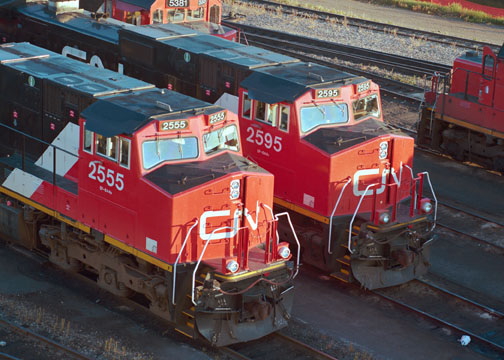Recalling Past Violence, Police Use Caution in Canadian Rail Blockade
OTTAWA (Reuters) - As a blockade of Canada's rail lines drags on and the economic impact deepens, police aware of the bitter legacy created by past fatal clashes with indigenous protesters have chosen not to clear the tracks by force.
For the past two weeks, campaigners blocked rail lines in Ontario, Quebec and Alberta in solidarity with a British Columbia aboriginal band that had stopped construction of the Coastal GasLink pipeline pipeline over its land.
The cautious approach follows raids and arrests against the Wet'suwet'en band earlier this month that triggered the ongoing protest. The continued presence of federal police on Wet'suwet'en land had been holding up talks between politicians and chiefs aimed at ending the standoff.
Public Safety Minister Bill Blair said on Thursday that the Royal Canadian Mounted Police (RCMP) had agreed to retreat from Wet'suwet'en land to a nearby town. The move "should bring us to a point now where the matter can be resolved," he said.
But Molly Wickham, a spokeswoman for the Wet’suwet’en Gidimt’en clan, said the RCMP had not yet left their land and added that the announcement "feels a lot like a media strategy" to diffuse the protests.
The Wet'suwet'en have been fighting the pipeline for a decade, but tensions built up since police made arrests and cleared protesters in January 2019. A December ruling by a British Columbia court led to this month's arrests.
Though Canadian National Railway Co obtained an injunction against those preventing rail traffic from moving along its trunk line near Belleville, Ontario, on Feb. 7, provincial police have been in no hurry to act.
"We don't have a role in the underlying issues of the event and we're not in a position to resolve them. Protests and demonstrations are often complex in nature ... our goal is to preserve the peace and maintain a safe environment," said Ontario Provincial Police (OPP) spokeswoman Lori Lobinowich.
Prime Minister Justin Trudeau's government and police insiders say deadly clashes over aboriginal groups' claims to land in Oka, Quebec, in 1990 and Ipperwash, Ontario, in 1995, as well as other violent confrontations, have changed their way of operating.
"Let's look at the history and not repeat what's gone on in the past. Everyone knows what happened during the Oka crisis, everyone knows what happened during Ipperwash," said Indigenous Services Minister Marc Miller.
In Oka, a Quebec police officer was shot dead during repeated clashes with Mohawks during a confrontation that lasted almost three months. The RCMP failed to restore order and the fighting ended only after troops were sent in.
At Ipperwash, the OPP shot dead an indigenous man after the provincial government ordered a park to be cleared of protesters. As a result, regulations were issued forbidding Ontario politicians from telling the police what to do.
"There are a number of things you have to take into account before you decide to take enforcement action and I think it's very much because of our historical experiences," said Tom Stamatakis, president of the Canadian Police Association.
Trudeau will hold a conference call with provincial leaders later on Thursday to discuss the blockades, his spokesman said.
Related News
Related News

- Kinder Morgan Proposes 290-Mile Gas Pipeline Expansion Spanning Three States
- Enbridge Plans 86-Mile Pipeline Expansion, Bringing 850 Workers to Northern B.C.
- Intensity, Rainbow Energy to Build 344-Mile Gas Pipeline Across North Dakota
- Tallgrass to Build New Permian-to-Rockies Pipeline, Targets 2028 Startup with 2.4 Bcf Capacity
- U.S. Moves to Block Enterprise Products’ Exports to China Over Security Risk
- U.S. Pipeline Expansion to Add 99 Bcf/d, Mostly for LNG Export, Report Finds
- A Systematic Approach To Ensuring Pipeline Integrity
- 275-Mile Texas-to-Oklahoma Gas Pipeline Enters Open Season
- US Poised to Become Net Exporter of Crude Oil in 2023
- EIG’s MidOcean Energy Acquires 20% Stake in Peru LNG, Including 254-Mile Pipeline





Comments